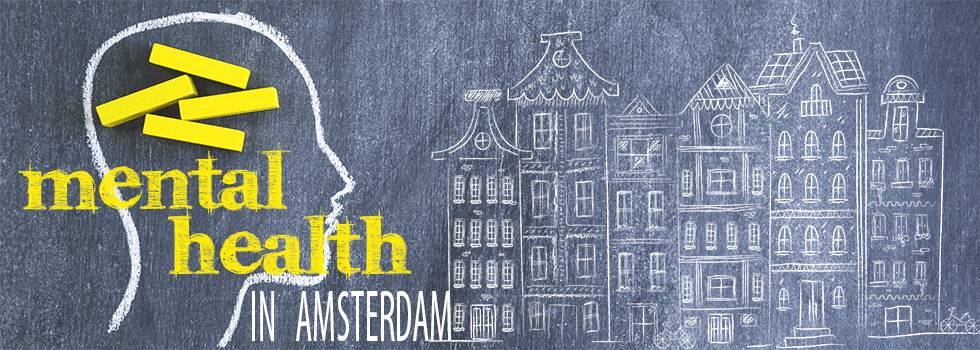Awareness of mental health is growing in the Netherlands and more people are seeking help to live with serious psychiatric conditions. Naturally, some of these people are parents. Annick Noirfalisse interviews US blogger Jennifer Marshall, about her life as a busy mother living with bipolar disorder, and Amsterdam Mamas Content Editor Audrey Coggins adds some Netherlands specific context and resources.
When we are more open, we can change society’s views and save lives. – Jennifer Marshall
According to The Hollands Times, “[While] the Netherlands enjoys a good reputation internationally when it comes to healthcare… one field in particular, psychiatric health care, is displaying worrying trends. New research conducted by the Vektis Care Information Centre has come to light, showing that the number of patients being treated for severe psychiatric disorders in the Netherlands has risen to over 220,000 [2017], an increase of 5000 from the previous year. Despite the growing number of patients suffering from this type of illness, reports further warn that many are not receiving the care they desperately need.”
Amsterdam Mamas wants to bring attention to mental health and provide some resources to help AM Community members who need them.
Jennifer Marshall – Pioneering a New Approach to Living with Mental Illness
Jennifer Marshall, an American wife, former corporate recruiter and mother of two (10 year-old boy and an 8 year-old girl) shares her views on motherhood and her bipolar illness, diagnosed in 2006. After being hospitalized no less than 5 times in her life as a result of severe manic episodes, she founded a non-profit organization to break the taboo surrounding mental illnesses.
In 2011, Jennifer ended her overly stressful recruiting career to follow her passion – writing – and soon started to blog about her mental illness. She did it at first anonymously, then a year and a half later under her real name.
Writing openly about her mental illness encouraged Jennifer to co-found a show in the summer of 2014 called This Is My Brave. The participants, who all live successful lives despite mental illnesses or addictions, share their personal stories through creative story telling, with the aim of ending the stigma surrounding mental illnesses. This Is My Brave is celebrating its 5th anniversary this summer and has so far held 59 shows in 37 cities, spread all over the US.
What are your main challenges as a mum with bipolar and how important is it for you to take your medicines?
Jennifer: Very! I guess my biggest challenge, like any mum, is that I don’t have enough hours in the day (of course, this does not really have to do with my illness). My symptoms are very controlled with medicine. I also have to take very good care of myself; I have to get very good sleep, so I try to not stay up late if I can prevent it. I do yoga three or four times a week. Kids have their activities and their needs, but you also have to make time for yourself, otherwise you will burn out. For me, the yoga classes are my time to exercise and de-stress.
Is eating healthy also one of your tips?
Jennifer: Absolutely! When I first got sick, I was not eating very well and I don’t know why people don’t realise more that what we put into our bodies affects our brain. It’s something so easy to see; yet so many people eat so much processed food. It’s just not healthy for your body and your mind.
The first thing was to get the right medicine and that took a long year. When you’re depressed, you don’t want to exercise or do anything. But luckily, my husband was very supportive and he would encourage me to go outside. He was so great! If I didn’t have that, I would have struggled for a lot longer.
What would you say to women who have a bipolar diagnosis and who want to have kids?
Jennifer: That you shouldn’t be afraid to pursue being a mum, just because of a mental illness or of bipolar. The first thing is to get to a stable place with your mental illness, so get to a place where you understand your symptoms and how to manage them effectively.
If you’re planning to get pregnant, you have to be smart about it. You have to work with your doctor, because if you are already taking medication for your bipolar disorder, you don’t want to go off that medicine necessarily to have a baby.
During my son’s pregnancy, I wasn’t on medicine. I took myself off it and I was working with a psychiatrist. But four weeks after he was born, I had a post-partum psychosis. That’s why the second time; I was intending to stay on medicine, but just not at the beginning when the heart is forming, because lithium has a heart defect risk.
So I took myself off lithium when I found out I was 5 weeks pregnant with my second child. Within a week, I couldn’t sleep. I was so excited! But that lack of sleep turned on the mania. I had to go to the hospital and take a lot of antipsychotics to bring me down. I remember being in the hospital thinking that this baby was not going to survive all these medicines I was taking. But she did! I still had to take medicines all the way during that pregnancy. She luckily wasn’t affected.
You have to weigh the pros and the cons, because the mother has to be healthy first and foremost. Luckily for me, my two are healthy.
Are you afraid that your children may one day be diagnosed bipolar?
We shouldn’t delay treatment if we recognise something. We’ve always been talking with them about it and been there when they’ve had questions.
How are you managing the Internet with your children in terms of their learning about bipolar?
Jennifer: At the moment they are more interested in video games than randomly going on the Internet to search for different things. But I know that in the next year, we’ll be spending a lot more time talking about the reality versus things that are put out there, which are negative and not necessarily true. I think that having an open line of communication is the most important thing.
It is clearly very important for you, as a parent, that our children live in a society where the stigma about mental illnesses is gone…
Jennifer: I think it’s the biggest issue facing our youth: how many we’re losing to suicide every day. I think mental health challenges are something every person is going to go through at some time in their life, whether they deal with a bout of depression or anxiety or more common issues.
If there were more people around the world educated about mental health issues, they could recognise the signs to prevent tragedies and losses by suicide. They could get people to help, instead of just watch them suffer. Access to care is also very important, because in the US, we have a lack of access. You wouldn’t say to someone who has a heart attack, “We’ll get you in hospital in three weeks”.
The other problem is that psychiatric medicines actually take time to work. So why is it that, when we have someone into a psychiatric hospital, that we push them out in three to five days, when their medicine hasn’t really started working yet? It’s terrible! That’s why lots of people end up coming back to hospital. We don’t take good enough care of people that are going through these issues.
Are you seeing a positive shift in mentality in the US with regards to mental illness?
Jennifer: Sure! I’ve been doing this work for six years and it’s definitely more accepted today than it was six years ago. But there is still a long way to go, especially in the workplace and in our schools. So I’m grateful for being able to lead an organization that encourages people to be more open. Because when we are more open, we can change society’s views and save lives.
Mental Health Support in the Netherlands:
A whitepaper released by GGZ Nederlands states that “in the course of the treatment of the two major mental health disorders – anxiety and depression – we may expect a 50% reduction in general practitioners’ and physiotherapists’ fees and costs involved in sick leave. Furthermore, full recovery from alcohol addiction, which, after anxiety and depression, is the most frequent mental health disorder and an important (hidden) cause of health care consumption and sick leave, is achieved in 30% of patients… Investing in the mental health of young people… may prevent unnecessary premature school leaving, criminal behaviour, long-term dependency on social benefits, or a high consumption of health care at adult age.”
Huisarts As soon as a newcomer is registered in Netherlands as a resident, the first thing you need to arrange is a huisarts (general practitioner, or GP). The first step is to speak with your huisarts who is able to refer you to various mental health professionals better suited to take the time to walk through what is often a harrowing time. Many companies with a large expat community have a company doctor who is also a valuable resource for help or referrals.
Psychologists/First Line Support If you find that you are struggling with mental health issues your GP will be able to refer you to a psychologist for a number of counselling sessions. The number is dependent on your health insurance package. Should you be suffering from a more serious diagnosis you’ll be referred to what is known as Second Line Support in a psychiatric hospital setting. The GP should always be your first port of call.
Online There are also online portals that provide anonymous support for mild mental or social problems (mild depression or anxiety).
Crisis/Emergency In a crisis situation or an emergency, our usual coping mechanisms can break down. Your huisarts will have an emergency option (24/7) to access health support immediately—normally option 1 on their answering machine.
Health insurance Another important step when beginning life in the Netherlands is to arrange for health insurance. Mental health is covered by most health insurance policies.
Existing mental health conditions Those with existing mental health conditions would be strongly advised to ensure that they have up to date translated copies of medical files, treatment plans and medication lists before moving to the Netherlands. The impotance of having medical bracelets, a care card, and any information that could make it easier to transition into what will be an alien system should not be underestimated.
Specific Links in the Netherlands
Read more about accessing mental health resources for youth and children.
GGZ Nederland (Dutch Association of Mental Health and Addiction Care) is the organisation of specialist mental health and addiction care providers in the Netherlands. GGZ Nederland aims to ensure the availability of high quality, accessible, affordable and sustainable mental health care.
And article in the Dutch Review provides more information on mental health support in the Netherlands.
An Amsterdam Mamas compiled list of Amsterdam-based resources for mental health and well-being.
For suicide prevention: (NL) 0900 – 0113
Immediate Help with Mental Health Issues
If you are experiencing serious psychological problems, including suicidal thoughts or tendencies, please know there is online help available 24/7 as well as the direct line (NL) 0900 – 0113. Are you or anyone in your family in a direct crisis? Crisis psychiatric help is always available through the emergency services of hospitals, referrals through your GP or huisenartpost, or outside of office hours by contacting Spoedeisende Psychiatrische Amsterdam at 020 5235433.
Pic credits: banner image photographed for The Washington Post by Amanda Voisard, bphope.com and Mental health in Amsterdam image by Audrey Coggins







